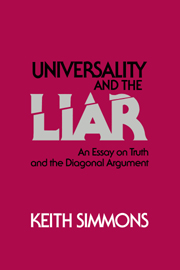Book contents
- Frontmatter
- Contents
- Preface
- Chapter 1 The Liar paradox
- Chapter 2 The diagonal argument
- Chapter 3 The diagonal argument and the Liar, I
- Chapter 4 The diagonal argument and the Liar, II
- Chapter 5 A medieval solution to the Liar
- Chapter 6 A singularity solution to the Liar
- Chapter 7 A formal account of singularities
- Chapter 8 Applications and further singularities
- Chapter 9 Semantic universality
- Notes
- Bibliography
- Index
Chapter 4 - The diagonal argument and the Liar, II
Published online by Cambridge University Press: 19 October 2009
- Frontmatter
- Contents
- Preface
- Chapter 1 The Liar paradox
- Chapter 2 The diagonal argument
- Chapter 3 The diagonal argument and the Liar, I
- Chapter 4 The diagonal argument and the Liar, II
- Chapter 5 A medieval solution to the Liar
- Chapter 6 A singularity solution to the Liar
- Chapter 7 A formal account of singularities
- Chapter 8 Applications and further singularities
- Chapter 9 Semantic universality
- Notes
- Bibliography
- Index
Summary
Recall our objection to Kripke's truth gap theory. A good diagonal argument shows that there are semantic concepts beyond the reach of Kripke's object language: These concepts are expressible only in a metalanguage. So although Kripke's object language can be said to contain its own truth predicate, it is not semantically universal. Further, Kripke's theory does not provide a model of “ordinary” English, or of some “significant stage” of natural language. For the semantic concepts that are inexpressible in Kripke's object language are available to the ordinary speaker of English.
This two-part objection to Kripke's theory may be generalized. In its general form, it presents a challenge to any purportedly non-Tarskian approach to the Liar, not just those, like Kripke's, that appeal to truth gaps. We can express the challenge in the form of two questions. First, does the theory give rise to semantic concepts that can be expressed only in a metalanguage, on pain of paradox? If the answer to this question is affirmative, then the scope of the proposed non-Tarskian theory is limited. And an affirmative answer to the first question prompts this second question: Are these semantic concepts available to the ordinary speaker, independently of philosophical reflection on the Liar? If the answer to this second question is also in the affirmative, then not only is the scope of the proposed solution put into question, but so is its significance. For the Liar is constructed out of our ordinary semantic concepts, concepts expressed by our ordinary semantic terms.
- Type
- Chapter
- Information
- Universality and the LiarAn Essay on Truth and the Diagonal Argument, pp. 62 - 82Publisher: Cambridge University PressPrint publication year: 1993



